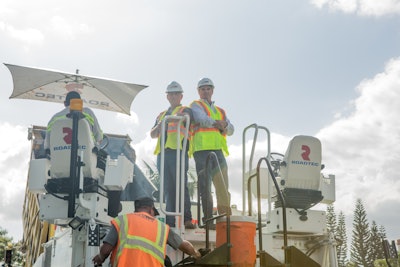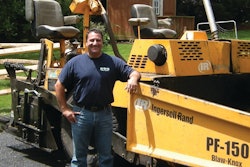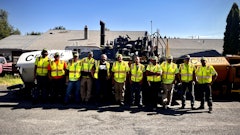
When Ken Goldberg and Jeff Cohen decided to start their own pavement maintenance company they had a vision they wanted to fulfill. They wanted a company that was not only responsive to customers but responsive to employees – and they wanted a company that encouraged and compensated its employees so they would stay with the company for the long term.
“We wanted to build a team, bring in good people and treat them differently,” Goldberg says.
Almost six years in, All County Paving can make the claim that even though they’re still growing, they’ve created the pavement maintenance business they outlined in their business plan. And maybe they can claim more than that.
Goldberg and Cohen bought the company in 2009 when it was known as M & M Asphalt and rebranded it as All County Paving. Today All County Paving employs 130 people doing site work, paving and pavement maintenance (patching, sealcoating and crack repair) from locations in Lake Worth and Orlando. Work is split almost evenly between paving and pavement maintenance.
Before the acquisition Cohen, who has worked in construction and paving his whole career, was working for a competitor. He was frustrated at that job because he thought he saw opportunities to generate sales even when the market is at the bottom [this was 2008-2009], and he says he had some ideas on different ways to get work done – but his employer wasn’t interested.
At the same time, Goldberg worked in financial services in bank, “which is very customer-centric, very focused on customer service and very relationship oriented.”
“Jeff was telling me some of his challenges and we put our heads together on how we could do things differently and maybe change the market a little,” Goldberg says. “We think we already have made a difference -- so much so that even our competitors are changing.”
MAKE NO SMALL PLANS
Goldberg and Cohen made a point of developing a detailed business plan prior to buying M & M Asphalt. “We had a plan to open All County Paving without any acquisition, to go stand alone,” Goldberg says. “Then we had the opportunity to purchase M & M Asphalt and that pushed us years ahead in our start-up business plan. M & M had a pretty good name in the area. They had a good name but it was very localized in Palm Beach County. Outside of that there was very little name recognition.”
Goldberg and Cohen did their due diligence and they learned what type of work M & M was capable of handling –pavement maintenance work – which was the type of work they planned on doing with their start up.
“We looked at job size and efficiency and we saw that we could make a fairly quick change to get our quality and production up to very specific levels,” Cohen says. “We didn’t have any pie-in-the-sky ideas. We were very realistic about what we could do. We knew that we could be very capable on the maintenance end and we realized ‘this is what we could do well right now’.”
“We identified who we were and what we were capable of doing,” Goldberg says. “We identified our competitors and what our strengths and weaknesses are.”
Goldberg says the company he and Cohen purchased only worked within a 10-mile radius of the company’s South Florida yard. Now, however, All County Paving works throughout the entire state of Florida, which has also driven his growth.
“Originally the company only serviced a small geographic area of Florida and we saw some potential there,” Cohen says. “We saw we could expand throughout Florida with how we handled our work, our quality and customer relations.
“Very few customers who seek out the kind of work we do have knowledge in this field, so our plan was to help educate them and see what they wanted and what they were trying to achieve,” Cohen says. “We are trying to provide long-term solutions and not just sell product.”
Goldberg says they targeted specific vertical markets, for 36 months pursuing customers in home owner associations, shopping centers, commercial buildings, medical facilities and multi-family properties. “We also targeted specific companies and individuals in those markets right down to the company, location and people who make decisions, actually listing them by name,” he says.
He says they also developed an elevator speech: “Anything you can walk on, drive on or play on from your front door to your driveway…as long as it doesn’t grow that’s what we do.”
So with a rebranded acquisition All County Paving was up and running. They had leapfrogged their business plan, getting years ahead of where their start-up would have been, and they were expanding from a local business to a state-wide operation. Now they needed the management team to guide the business and the workers to get the work done the way they envisioned.
DEVELOPING A MANAGEMENT TEAM
Today All County Paving has a seven-person management team divided among accounting, operations, supervisors, paving operators, maintenance, scheduling and sales. A human resources hire is in the offing but Dave Goldberg, Ken’s dad, works behind the scenes with human resources as an active recruiter for the company. He also is “the voice of reason,” providing a new viewpoint, on the rare occasions when his son and Cohen can't settle on a decision.
But initially the two men ran the company’s operations themselves, though their organizational chart called for a specific person to run operations. “We always planned to have someone run the operations when the business called for it but until then we did it ourselves.” And when the time came the plan changed and after a year or so of growth they hired their first management-level employee: an operations manager.
Cohen and Goldberg say the first thing they developed as they put their business plan and team in place was an All County Paving organizational chart. The organizational chart outlined responsibilities and (probably) the order of new hires. Cohen and Goldberg say they didn’t establish benchmarks indicating at which point it was time to hire for specific jobs, relying instead on their feel for what was going on in the market and how the company was handling its work and growing. The chart, they say, like the business plan, is a living document that flexes as the company’s needs change.
“It’s not like business plan that’s stuck in stone. We had to change it as the industry changed,” Cohen says.
Goldberg says that one of the most challenging aspects of the growing company was adapting the management team to the changing company as it grew.
“Management did evolve through trial and error and we had to evolve with the times,” Goldberg says. “Our head of operations is a perfect example. Three years ago those responsibilities were completely different from what they are today, and the person we hired for the job initially was great at the time but as we evolved we had to find a more-skilled person to help us. We had to change that person and position as the company grew.”
Next to come on board was a bookkeeper/office manager, followed by a paving-specific production manager as paving work became more plentiful. Throughout all this and until now both Cohen and Goldberg were doing sales and field work.
“We like to spend time with our customers and on the job with our crews,” Cohen says. “We like to show our face and let them know we’re human, to let our crews know we’re not just sitting behind a desk telling them what to do.”
He says the two of them also make up to six sales calls a day.
“It goes a long way when the customer sees one of the owners show up on a job or on a sales call,” Goldberg says. “We don’t go on every single job or every single sales call, that’s impossible. But customers like to see it and employees like to see it too.”
A FUTURE FOR EMPLOYEES
Acquiring M & M Asphalt provided All County Paving with an established crew right from the start. “That gave us some decent employees in the field and doing a good job right off the bat,” Cohen says.
It also gave them a cushion so they could actually perform work and generate revenue while they were looking for and bringing in the types of employees they wanted and training them the way they wanted them to be trained.
Goldberg says they pursue “people like us” who have a strong work ethic, experience in this industry, understand how the business works, who communicate well, and who work with care – and they want to hire people who might like to stay with the company as a career choice.
That’s because part of their business plan – and one of the reasons they wanted to start their own company – is they wanted to treat employees well so they could build a productive, long-lasting All County Paving team. So Cohen and Goldberg say All County Paving decided to treat its employees differently than many other contractors treat their employees. In addition to health insurance for all employees, All County Paving offers profit-sharing and employer-funded pensions in which all employees are vested after one year of employment.
“We offer everybody a future,” Goldberg says. “We tell them what’s going to happen, what they need to do to advance to another level or position, we help them when they need it and when we can, and we have an open door policy at all times.”
Cohen and Goldberg say their approach to their employees is based largely on their different experiences prior to forming the company. Where Goldberg, in the financial industry and the world of “big business” was used to raises, bonuses and job security, Cohen, in the construction industry, had none of that.
“And it weighed on me,” Cohen says. “I have a family, a mortgage etc. and I was at the whim of my employer. We thought there has to be a better way to handle employees, where there is security for employees and work environment is better.”
Goldberg and Cohen realize this is a big departure from the way many contractors run their business. “A lot of contractors are old school and have been ‘doing it this way’ for 30 years, and it’s very difficult for them to change,” Goldberg says.
“We want to bind the best of the best to the company,” Goldberg says. “We want to get the best employees out there, train them and retain them and it’s worked.”
Goldberg says the company “takes a hit” on the front end money-wise funding the benefit programs, and salaries “are at the higher end for the market,” yet All County Paving is still able to be competitive.
“We feel we make it up on retention and production,” Goldberg says. “Bidding-wise we’re competitive because we’re getting better quality work and better production because we have a better workforce,” Goldberg says.
“We don’t want to be the cheapest guy on the block,” he says, adding that less than 10% of All County Paving’s business is hard bid. “Most of our work is by word-of-mouth referrals. People go with us not because we’re the cheapest guy but because we have the best quality.”
ATTRACTING EMPLOYEES
But Cohen and Goldberg say the right people aren’t easy to find.
“At the end of the day it boils down to this: There’s a limited labor pool in Florida and we have to work twice as hard to get our desired result, to get the kinds of people we want who can produce quality work in an efficient manner. They’re not easy to find,” Goldberg says. “Obviously you can’t find that in somebody right out of college.”
So right from the start Cohen and Goldberg cultivated relationships – some for as long as two years – before the invite people to join the company.
“In fact when we started out in 2009 we had people who kept an eye on us, waiting to see if we were going to make it or not because they liked things they’d heard about us and they liked the quality of work we were producing,” Goldberg says.
Because Cohen and Goldberg were always in the field at the start they met workers at all levels, talked with them and kept in touch. “We focused on people we thought were quality people who felt unappreciated or who felt stuck and we just kept in touch with them. We pursue people where we can actually see what they’ve done,” Cohen says.
“In the grand scheme of things it’s a small industry and people talk and people have reputations and we pay attention to that. We are interested in what kind of production levels they had, how they handled people and then we started going after them. This has been very successful.”
After a year or so All County Paving actually started to attract employees. “People saw good work and we were running six and seven days a week and no one else was doing much work at the time and here we were giving out bonuses,” Cohen says.
When Cohen and Goldberg get around to talking with a prospective employee they make clear what they see as differences between All County Paving and other contractors. “We tell them ‘here’s what we offer and here’s why we offer that,” Cohen says. “We make it clear to them that we’re looking to grow the business but we let them know the goal isn’t to be working seven days a week. We want them to know that as we grow everyone will be able to reap the benefits. It’s all on the table and the upside is we find the good ones. That approach has worked very well.”
[possible captions]
Ken Goldberg says All County Paving has changed the way contractors pursue work, ignoring yellow pages advertising and instead exhibiting at trade shows and joining associations. “That marketing is starting to work, and our competitors are doing the same things,” he says. “Now we go to trade shows and there are 10 paving contractors there and there used to be no one other than us. Now we’re trying to figure out what changes to make so we don’t stay static because if we stay static we’ll get passed up.”
As much as 20% of All County Paving’s work is new construction paving – a figure that used to be considerably less. “A building boom in Florida has moved paving & new construction higher so we started to target new construction work,” says Jeff Cohen. “Those efforts combined with the pickup in new construction have driven that part of our business higher.”
“We examined the market, developed a plan, followed our plan, and we grew,” says Ken Goldberg.
“The goal is to build the team and then enable them to grow in their career and their family and help us grow as a company,” Goldberg says.



















